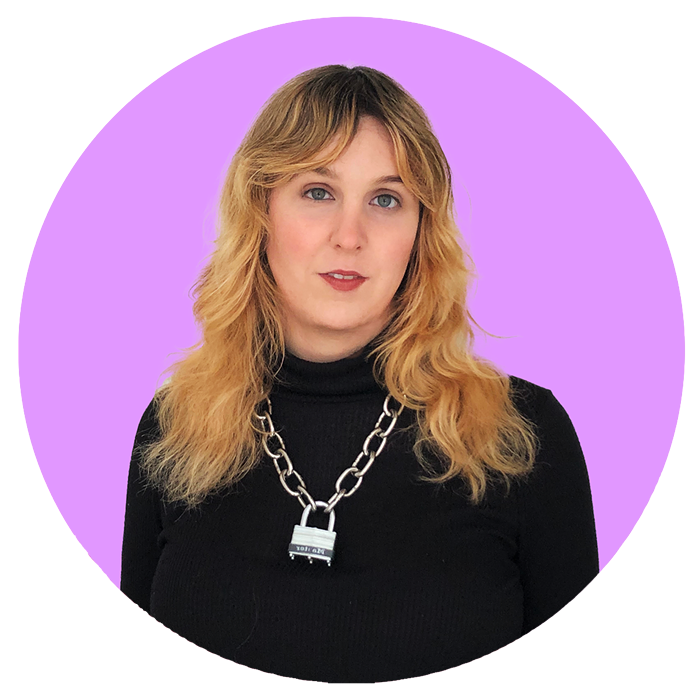In 2012, Washington's LGBTQ activists were celebrating. Voters had just approved a groundbreaking marriage equality law. Years of hard work paid off. But some trans people who’d fought with them anticipated a cooling after this great burst of excitement, as if the big gay party would soon end and they’d be left to turn out the lights.
As confetti still fell, a new group of trans activists called Gender Justice League emerged with a clear message: It’s time for trans rights. They’d waited long enough.
Trans Pride was an early idea, a joyful free-speech march and gathering with artists and performers at Cal Anderson Park in June of 2013. It was not the first trans pride event in Seattle—one was organized by two trans men in 1997—but it's endured for ten years.
The Stranger called up three founding members of GJL, Tobi Hill-Meyer, Elayne Wylie, who still produces the event, and current Executive Director Danni Askini, to hear how it all happened.
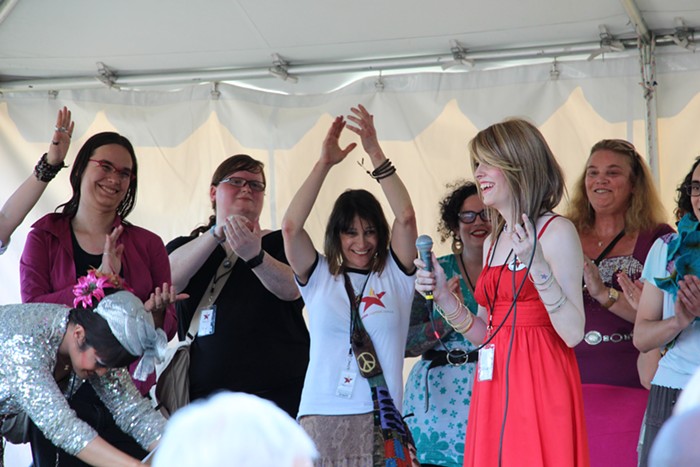
Founding Gender Justice League
Elayne Wylie: In the spring and the summer of 2012, there was marriage equality and Ref 74. It was such a big deal and there was so much energy. It felt like every LGBTQ organization was attached in some grand clockwork mechanism to each other to make this work. What we were also seeing was people getting ready to wash their hands, dry them off, and move on. And we're like, “But wait!” We still need a lot of work.
Danni Askini: During that campaign, I think a lot of trans people felt frustrated. The campaign didn't really shove us to the back of the closet exactly, but they didn't include trans people at all as spokespeople. Or talk about trans people in same gender couples. We were like, “Listen, we should prepare the public for what is going to come next,” which is the moment that we have been in for the last 10 years, which is what I would call the “trans panic” period. We really felt strongly and founded Gender Justice League around August 2012. It really took off in January 2013.
Elayne: We didn't know what our organization was going to look like. But we knew what we wanted to do.
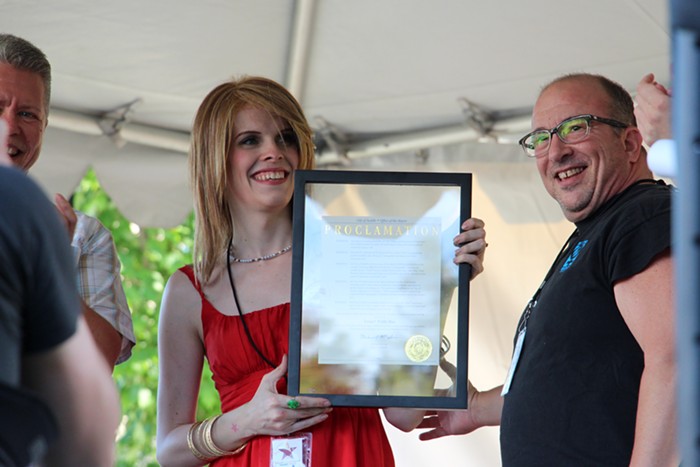
Tobi Hill-Meyer: Very early on [in GJL], the Department of Health was putting out some funding for HIV testing and services. And it specifically did not require that those services be made available to trans people. [Before GJL] I would have called and said, “Hey, this doesn't make sense. Can you do something differently?” But with Gender Justice League newly formed, we were able to put out a call for 20 people to show up to a meeting. We could do things more effectively because there were more of us working together.
Elayne: We asked [the community]: What is important to us? Clearly, health care access. Do we even have health care? Is trans health care covered? What are the downstream effects of trans care not being covered? What about something as stupid and simple as identity documents? I’m 50, so here's a story from 1997. I won tickets to see Oasis perform in London. But the problem was if I got a passport, I would be entered into a Federal State Department database with, you know, with an M and my driver's license instead of an F. That kind of terrified me, because it would always, I felt like it would always paint me as this other. So I actually declined. I said, “Why don't you just send me some CDs instead?” I should have asked for concert tickets. But I didn't have that confidence.
Tobi: Sometimes it's hard to even realize how things were … when it was common for insurance companies to have a clause saying that they wouldn't cover anything related to being trans. And that some of those companies would interpret that so wildly to be like, “Oh, you're a trans woman who broke your arm during the lesbian softball game? Well, if you hadn't transitioned, you wouldn't have been in that game. So we're not going to cover your broken arm.” That's a real thing. That happened here in Washington. Even myself, I had a time when I went to a doctor appointment to get an allergy test. And the doctor asked me what medications I was on, and then asked me why I was on those medications. The insurance company looked at those notes and said, “Oh, you talked a lot about trans stuff, so we're not going to cover it.” Thankfully, the doctor wrote it off, because it was kind of her fault. That was probably around 2008, 2009.
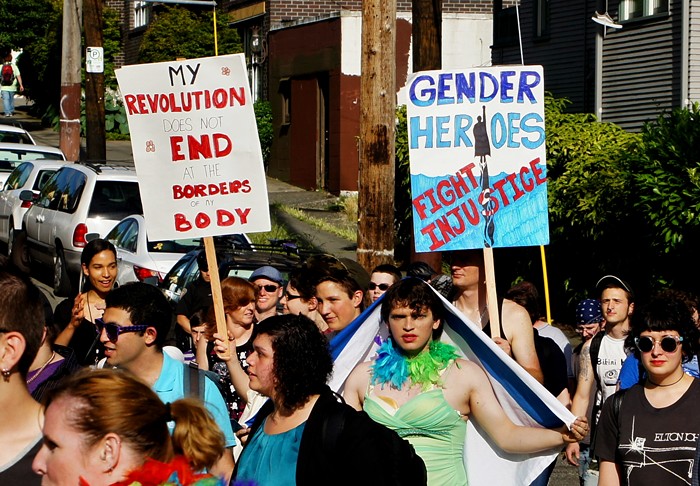
Why Trans Pride?
Elayne: People wanted a unified Trans Day of Remembrance event. And, as we got together, it felt a little discouraging.
Danni: It’s an important reminder of people that we've lost, but it's also incredibly mournful and it situates trans identity around trans death—as opposed to life, and joy, and celebration.
Elayne: As a white trans person, I am one of the groups that is least likely to see violence. We want to support the groups and organizations filled with members that are much closer to those things. It [felt] more important, rather than creating just another event, why don’t we support the people already doing those events?
Danni: I actually attended the first TDOR in ’98, in Boston, if you can believe it. Having gone to many TDORs, the critique, by particularly trans women of color, is that it felt exploitative often that white trans people mourned the death of trans women of color, drawing attention to those murders to build political capital for rights. We support trans women of color-led TDOR events—Utopia does a TDOR event. [The Diversity Alliance of Puget Sound] does a TDOR. But we don't do a TDOR in part because of that critique. We wanted to have a celebratory event that showcased artists and performers, and brought together community organizations.
Elayne: I was, at that moment, a board member for Seattle Pride. So I thought, “Hell yeah, it's doable. It's not just possible. We can do this.” We leaned on advice and experience from seasoned event producers. We got sponsored by the city's neighborhood grants.
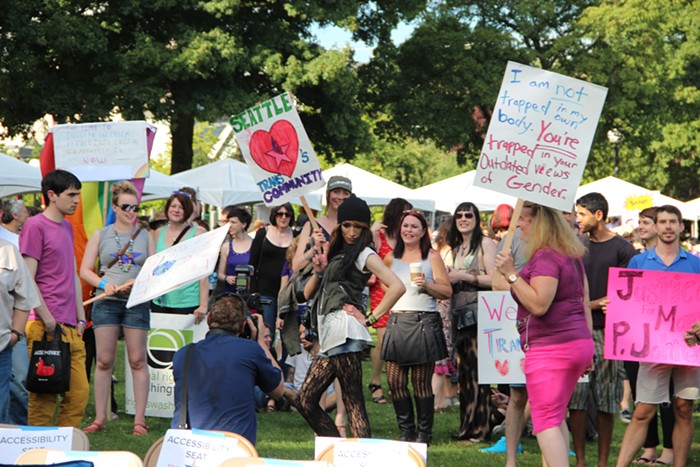
Danni: The biggest barriers at the start were funding. We also really had a focus of not accepting corporate donations. We don't want our message co-opted. We want to retain complete control over what we say and do especially in an increasingly polarized period of time, where everything is called “grooming,” we don't want to have to answer to corporations. And we also don't want to become an advertising platform, so that they can exploit our community, which is already disenfranchised.
Tobi: Sometime during the planning, the FBI reached out to us to share that there has been a threat made against us on a radical web board. [The FBI] wanted to show up and provide fencing around the entire event and check people's bags when they entered. It was just like, “We can't have that happen.” If it's fenced in and the police are standing at the gate, no one's going to want to come in. We had to have a lot of conversations about trying to negotiate down to a more limited police presence and eventually managed to get something reasonable that people attending the event would feel comfortable with.
[The FBI] never shared the details of the threat. But I did later find an anarchist web board, where there were a lot of people talking about how they expected the event would be mostly liberal. They wanted to have a strong presence of radicals attending Trans Pride as well and they were encouraging anarchist trans people to attend the event. I don't know if that was the threat or not, but it made me think perhaps this whole overreaction was a “threat” that members of our community were threatening to attend. In 2012, we were not worried about the Proud Boys. The only kind of anti-trans protesters we would expect were the people who show up to every Pride event with giant signs saying everybody's going to Hell.
Danni: There were a lot of naysayers. When I told people that we were going to do Trans Pride, people were like, “That's a terrible idea. It'll never happen. People won't show up. There'll be 10 people at the corner of a street.” People were very pessimistic about it. But in my heart of hearts, I knew that, like, trans people, and our friends and allies would show up, and that it would be a big deal … I'm a painful optimist.
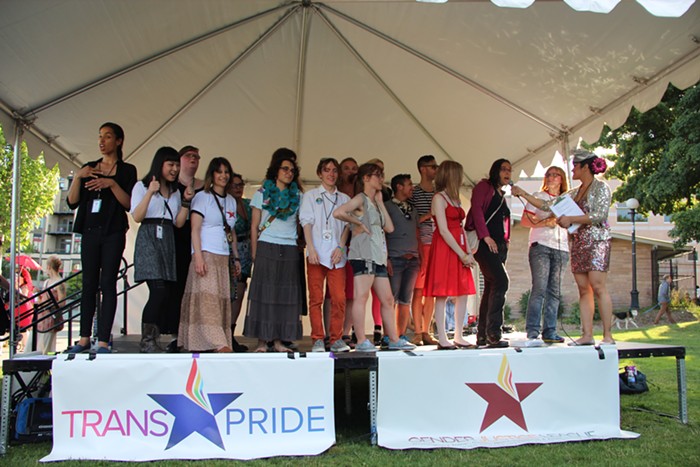
The Big Day
Elayne: I remember thinking, if we're lucky, if we're so lucky, we might get 750 people. No—we got 3,000 people. I had this experience of being next to the stage, watching people come into the park. And then looking over and seeing blocks away, people still marching. And it was in that moment, I like, we have something. This is intense! People really want this.
Danni: I remember how monumental the march felt. It was the most trans people up to that point that I've ever been around at once in my entire life.
Tobi: For so many people, that was their time to reach out to the trans community. People from nearby Seattle or other parts of Washington, or people who had just come out, or people who had been out for a long time. [At that time] the main community connections had been through support programs; when you've been out for a long time, you get to a point where you don't need support programs and stop showing up to those. We ended up with a lot of people having an opportunity to see that it really is a large community and have a moment where the isolation so many people experience is something that you can just step out of.
Danni: I was really sick. Most people don't know this, but I had aplastic anemia, which is like a bone marrow disease. My bone marrow was failing. I thought I was … I was getting to the place of, it's been two and a half, almost three years [searching for a donor]. I thought, after this big, coup de gras event, I'm gonna go into hospice. I weighed like 87 pounds or something. I thought it was gonna be this cute little trans community picnic with a stage. I just remember that first year and I'm so proud. I can't even describe the amount of joy and gratitude and like, yeah, I was so grateful. Like how incredible our community is, and how powerful we are, and how beautiful we are. It's just like, all I could have ever wished for.
Tobi: I was tabling [about my writing and my art]. I just remember talking to people the entire time, I had like, a 15-second intro that I would give to people about why I was there and then have a chance for them to ask me questions. It was just constant. By the end of it, my voice was getting really weak.
Danni: Lornet Turnbull, who unfortunately passed this last year, did a cover story in the Seattle Times. It was the first time that trans people had ever been above the fold in the Seattle Times, and it was for the first year of Trans Pride. That felt really momentous, especially after marriage equality.
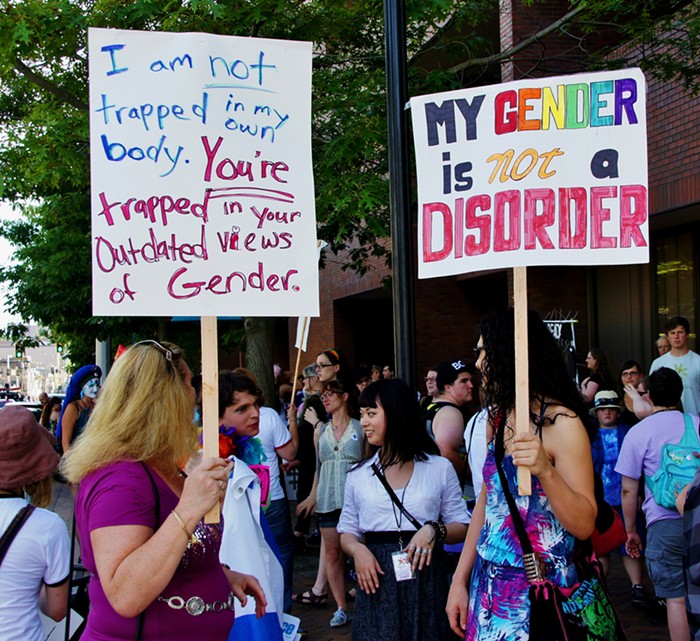
Some Things Change, Some Things Don’t
Danni: I'll say that every year, it hasn’t gotten any easier. It's a Herculean effort to pull it off.
Elayne: You know, if we had a million dollars, we’d pay everyone and it would be much more effortless. There is so much blood, sweat, tears, and Band-Aids that occur among such a small group of people. I remember, for many years, everyone's gone, it's 11 pm, and we packed everything on the truck and I look around and there's just eight trans women. It's the same eight people over and over again. And you know, you've heard all the news. Five hundred and some legislative bills, attacking trans people.
Tobi: In 2019, when we were preparing for Trans Pride, the Proud Boys announced that they were going to be holding a rally on the same day. It’s been a struggle since the beginning to negotiate with police around what minimal level of presence they feel comfortable with. We were able to put together this whole security team and that made it so the police were comfortable only having a couple of bicycle cops a few blocks away and a promise that we would call them if it was necessary. They trusted us to take care of the rest of it.
[In 2019], there had been over 100 attempts by Proud Boys to enter the area. Every single one of those times they were intercepted and encouraged to leave. One thing I heard more than anything else from people attending was, “Well, I guess the Proud Boys didn't show up.” They had no impact on our community, because our security team was so organized and prepared. As we see more and more threats to our community, and threats to our physical safety, and examples like Coeur d’Alene Pride, that has several guys in a U-Haul, geared up with weapons—it's getting more and more necessary to have some kind of security.
Elayne: [That first year] Danni called in personal favors from some trans and gender-diverse people that she knew. Comedian Ian Harvie. Julia Serano, who is a celebrated author. They were absolutely well received and we loved them. Some of the feedback we got was like, “Also, that was a very white selection.” We reflected on our choices to make sure that in our future lineups were able to center talent that was not so monolithically white. We sought community input every year since then to ask, “Who should we have on our stage?” It yielded some of the most incredible moments on stage. Watching Bamby Salcedo speak, at length, about the plight of immigration detention and how trans people are treated there. She had long, luxurious, bleached blonde hair that was so gorgeous, she was reading her—her friend on stage was shaving her head. So she cut off all of her hair on our stage. That's really cool.
View this post on Instagram
Listening to CeCe McDonald, talk about what it was like to defend herself from transphobia and violence and inadvertently, in self-defense, she killed the guy with her scissors and went to jail for it. She went to a men's prison. The trauma of that, and watching her relive that trauma on stage and express that, I think it was very galvanizing for people. We really sprinkle in a smattering of both national and local voices.
Danni: We’ve never had anybody perform twice on our stage and every year we have just, like, mind-blowing performances. It’s never stopped. This year, we are going to have Angel Bonilla and House of Ada is going to come up from Portland. Zooey Zephyr is coming from Montana. I don't think people in Seattle think of it as like a global hub of trans life, but our draw nationally of being able to bring people that are really important to the community, from all over the country to Seattle to perform or speak on our stage. It feels really powerful because I don't know that there are a lot of other Trans Prides around the country that can do that, or that do do that. I know San Francisco Pride March has been going on the longest and is definitely the largest. There's never been a DC Trans Pride. Houston. Massive city, right? Massive Pride event. No Trans Pride. We've had it for a long time. We can continue to have it. It fills my heart with joy every year. It's like both the bane of my existence and also the highlight of my year. It's like, a nightmare to make all the moving pieces happen, but then the day of it's just like floating down the river in an inner tube of love and joy.
Trans Pride Seattle is Fri June 23 at Volunteer Park Amphitheater, 1400 E Prospect St, 6-9:30 pm, free, all ages. This post has been updated.

